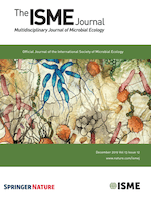
ISME Journal
Scope & Guideline
Inspiring collaboration across the realms of life sciences.
Introduction
Aims and Scopes
- Microbial Ecology and Evolution:
The journal explores the ecology of microorganisms in various habitats, examining how microbial communities evolve and interact within their environments. - Biogeochemical Cycles:
Research often focuses on the role of microbes in biogeochemical processes, including nitrogen, carbon, and sulfur cycles, highlighting their importance in ecosystem functioning. - Microbial Interactions and Community Dynamics:
There is a strong emphasis on understanding interactions within microbial communities, including competition, cooperation, and the effects of predation and parasitism. - Host-Microbe Interactions:
The journal publishes studies on the relationships between microbes and their hosts, including plants and animals, elucidating the role of microbiomes in health and disease. - Novel Microbial Metabolism and Functionality:
Research featuring metabolic pathways and the functional capabilities of microbes, particularly in relation to environmental changes and stress responses, is a key focus. - Microbial Responses to Environmental Stressors:
Investigations into how microbial communities adapt to changing environmental conditions, such as climate change and pollutants, are frequently highlighted.
Trending and Emerging
- Metagenomics and Multi-Omics Approaches:
There is an increasing trend towards using metagenomic and multi-omics methodologies to understand microbial community structure and function, allowing for deeper insights into microbial interactions and ecosystem processes. - Microbiome Engineering and Synthetic Communities:
Research on synthetic microbial communities and microbiome engineering is gaining traction, reflecting a growing interest in manipulating microbial interactions for applications in agriculture and health. - Climate Change Impacts on Microbial Dynamics:
Studies addressing how climate change affects microbial community dynamics and functions are emerging as a critical area of research, emphasizing the role of microbes in responding to environmental stressors. - Cross-Kingdom Interactions:
Research on interactions between microbial communities and higher organisms, including plants and animals, is trending, particularly in understanding how these relationships influence health and ecosystem resilience. - Antibiotic Resistance and Microbial Ecology:
The intersection of antibiotic resistance and microbial ecology is increasingly prominent, as studies explore how microbial communities adapt to antibiotic pressures and the implications for human health.
Declining or Waning
- Traditional Microbial Taxonomy:
Research specifically focused on classical microbial taxonomy appears to be waning as the field moves towards more integrative approaches that combine genomic, ecological, and functional insights. - Single-Species Studies:
There is a noticeable reduction in publications focusing solely on individual microbial species, with more emphasis now placed on community-level interactions and dynamics. - Static Models of Microbial Processes:
Static models that do not account for temporal changes in microbial communities are becoming less common, as dynamic and predictive modeling approaches gain traction.
Similar Journals

AIMS Microbiology
Exploring the frontiers of microbiology with open access knowledge.AIMS Microbiology, published by the American Institute of Mathematical Sciences (AIMS), is an esteemed Open Access journal dedicated to advancing the field of microbiology since its inception in 2015. With an ISSN of 2471-1888, the journal aims to disseminate high-quality research and innovative findings pertaining to both fundamental and applied microbiology, encompassing areas such as medical microbiology, immunology, and related life sciences. Recognized for its academic rigor, AIMS Microbiology has achieved a significant standing, evidenced by its current Q2 ranking in both Microbiology and Medical Microbiology categories, along with impressive percentile rankings within prestigious Scopus metrics. Based in the United States, the journal not only emphasizes accessibility and widespread dissemination of knowledge but also plays a crucial role in fostering collaboration among researchers and professionals in the microbiological sciences. By providing a platform for collaborative research and innovative ideas, AIMS Microbiology is poised to influence the future development and application of microbiological research, making it a valuable resource for students, researchers, and practitioners alike.

ISME Communications
Empowering Researchers to Shape a Greener TomorrowISME Communications is an esteemed journal dedicated to advancing the field of environmental microbiology and its multifaceted intersections with ecology, biogeochemistry, and biotechnology. Published by SpringerNature, this journal aims to disseminate cutting-edge research and innovative insights that address pressing global challenges through interdisciplinary approaches. With a commitment to open access, it provides a platform for researchers, professionals, and students to share their findings widely, fostering collaboration and knowledge exchange. Although the journal is relatively new, its potential for impactful contributions is substantial, making it an essential resource for anyone interested in the microbial processes that underpin ecosystem functioning and sustainability. The journal not only prioritizes the rigorous peer-review process but also supports the academic community's pursuit of excellence in environmental science.
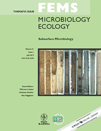
FEMS MICROBIOLOGY ECOLOGY
Illuminating Microbial Interactions for a Healthier PlanetFEMS Microbiology Ecology is a prestigious journal published by Oxford University Press, specializing in the dynamic field of microbiology and its ecological implications. With an impressive impact factor and consistently ranked in the top quartiles (Q1) across multiple categories—including Applied Microbiology and Biotechnology, Ecology, and Microbiology—this journal serves as an essential resource for researchers and professionals aiming to advance their understanding of microbial interactions within ecosystems. Established in 1990 and spanning to 2024, FEMS Microbiology Ecology delivers cutting-edge research, reviews, and insightful discussions that illuminate the complex roles microorganisms play in environmental health and sustainability. Located in the United Kingdom, this journal provides a global platform for discourse, making significant contributions to both theoretical frameworks and practical applications in the biotech and environmental science sectors. Researchers and students alike will find a wealth of information that not only enriches their knowledge but also inspires innovative solutions for ecological challenges.
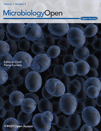
MicrobiologyOpen
Pioneering open access research in the world of microbiology.MicrobiologyOpen is a prestigious, open access journal published by WILEY, dedicated to advancing the field of microbiology. Since its inception in 2012, this journal has firmly established itself as a significant platform for researchers, professionals, and students alike, facilitating the dissemination of high-quality research findings across a wide range of microbiological disciplines. With an impressive impact factor and a ranking in the 76th percentile of Scopus for immunology and microbiology, MicrobiologyOpen offers a robust forum for innovative studies, reviews, and compelling insights that push the boundaries of scientific understanding. The journal's commitment to open access ensures that groundbreaking research is freely available to the global community, fostering collaboration and knowledge-sharing. As it continues to evolve until 2024, MicrobiologyOpen remains pivotal for anyone looking to stay at the forefront of microbiological research.

Microorganisms
Championing high-quality research in microbiology.Microorganisms is a leading open-access journal published by MDPI based in Switzerland, catering specifically to the rapidly evolving fields of microbiology and virology. Since its inception in 2013, the journal aims to foster the dissemination of high-quality research through its comprehensive and interdisciplinary platform, with a particular focus on both fundamental and applied microbiological sciences. Contributing to its esteemed reputation, Microorganisms holds a commendable Q2 ranking in the categories of Microbiology and Virology, as well as in Medical Microbiology, highlighting its significance in the academic community. With a consistent impact, evidenced by its rankings in Scopus—such as rank #25 in Virology and #56 in Microbiology—the journal serves as an invaluable resource for researchers, professionals, and students looking to stay at the forefront of microbiological research. As an open-access journal, Microorganisms ensures that vital research findings are readily available to a global audience, promoting collaboration and innovation in the study of microbial life and its implications for health and disease.

MICROBIAL ECOLOGY
Pioneering research at the intersection of ecology and microbiology.MICROBIAL ECOLOGY, published by Springer, is a premier journal dedicated to advancing the field of microbial ecology, illuminating the intricate relationships between microorganisms and their environments. Established in 1974, the journal reflects a strong historical commitment to disseminating high-quality research, with its current scope encompassing groundbreaking studies that explore microbial dynamics in various ecosystems. In the 2023 rankings, it has secured a prestigious position in Q1 across multiple categories, including Ecology, Evolution, Behavior and Systematics, and Soil Science, indicating its influential contribution to scientific literature. While it does not offer Open Access, the journal remains highly accessible to researchers and professionals via institutional subscriptions. With an impressive Scopus ranking across significant ecological categories, it serves as an essential resource for academics looking to deepen their understanding of microbial interactions and ecological processes, thereby facilitating innovative research and practical applications in environmental science.
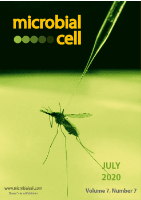
Microbial Cell
Advancing the frontiers of microbial science.Microbial Cell is a distinguished open-access journal published by SHARED SCIENCE PUBLISHERS OG, focusing on the dynamic fields of microbiology, biochemistry, and molecular biology. Since its establishment in 2014, Microbial Cell has been at the forefront of disseminating cutting-edge research essential for advancing our understanding of microbial functions and interactions. With a commendable impact factor and ranking in the top quartiles (Q1 and Q2) across several categories, including Applied Microbiology and Biotechnology and Parasitology, this journal serves as an invaluable resource for researchers, professionals, and students alike. It features a comprehensive scope that encompasses the latest findings in genetics, cell biology, and virology, facilitating the academic community's access to high-quality peer-reviewed work. Microbial Cell not only contributes to advancing microbial sciences but also fosters an inclusive platform for knowledge sharing and collaboration in the scientific community.
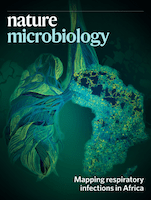
Nature Microbiology
Empowering Researchers to Shape the Future of MicrobiologyNature Microbiology is a premier journal published by NATURE PORTFOLIO that has firmly established itself within the realms of microbiological research since its inception in 2016. Based in the United Kingdom, this prestigious journal specializes in the intricacies of applied microbiology, cell biology, genetics, immunology, and medical microbiology, making it a cornerstone for academics and professionals alike. With an impressive Scopus ranking placing it in the top tier across various relevant categories—such as rank #3 in Genetics and #2 in Applied Microbiology—it underscores the journal’s commitment to high-quality, impactful research. Although it operates under a subscription model, Nature Microbiology's broad Open Access policy facilitates greater dissemination and visibility for its authors. The journal's objectives are centered around publishing cutting-edge advancements that enhance our understanding of microbial life, its interactions, and applications in health and disease. As a Q1 journal across multiple disciplines, it holds immense significance for researchers, professionals, and students enthusiastic about the latest innovations and breakthroughs in microbiology.

Cell Host & Microbe
Connecting Microbiology with Health and DiseaseCell Host & Microbe is a premier journal published by CELL PRESS, dedicated to advancing the field of host-microbe interactions and infectious diseases. With an impact factor reflecting its esteemed position among scholarly publications, this journal not only focuses on the intricacies of microbiology but also delves into critical areas such as Cancer Research, Immunology, and Molecular Biology, maintaining a distinguished Q1 ranking across several categories. Since its inception in 2007, Cell Host & Microbe has been at the forefront of disseminating high-quality research, providing invaluable insights for researchers, professionals, and students alike. The journal is committed to promoting understanding of the complex relationships between microbial entities and their hosts, filtering groundbreaking research from the top echelons. Located in the heart of Cambridge, MA, USA, this journal serves as an essential resource for anyone looking to deepen their knowledge in microbiology and its applications in health and disease.

Animal Microbiome
Transforming Animal Health through Microbial InsightsAnimal Microbiome is a leading peer-reviewed journal dedicated to advancing research in the interrelated fields of microbiology, veterinary science, and animal biology. Published by BMC, this open access journal has been a valuable resource since its launch in 2019, providing a platform for the dissemination of groundbreaking studies and reviews that enhance our understanding of the complex microbial communities and their effects on animal health and ecosystems. As evidenced by its prestigious Q1 rankings in various categories—including Agricultural and Biological Sciences, Animal Science and Zoology, and Microbiology—Animal Microbiome reaches a global audience, positioning itself among the top 5% of journals in its field. With an impactful presence in Scopus, where it ranks highly for its contributions, researchers, professionals, and students can access a wealth of knowledge and innovations through its open access model. The journal aims to foster interdisciplinary collaboration and elevate scientific discourse surrounding animal microbiomes, ultimately contributing to enhanced animal welfare, improved agricultural practices, and a deeper understanding of microbial dynamics in health and disease.